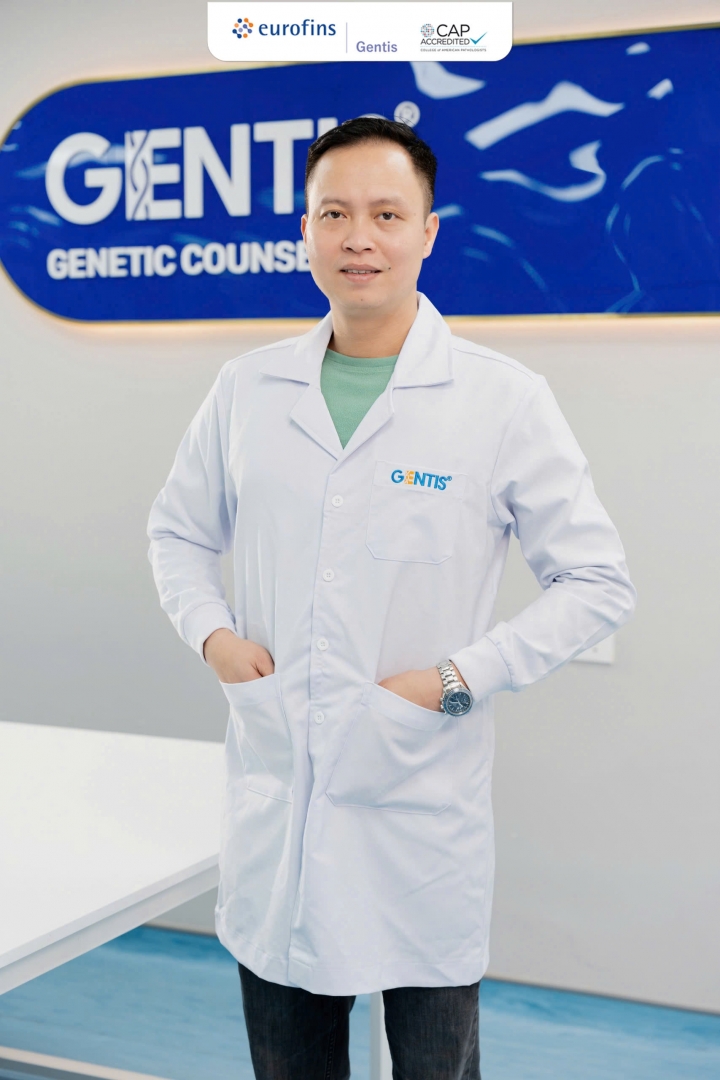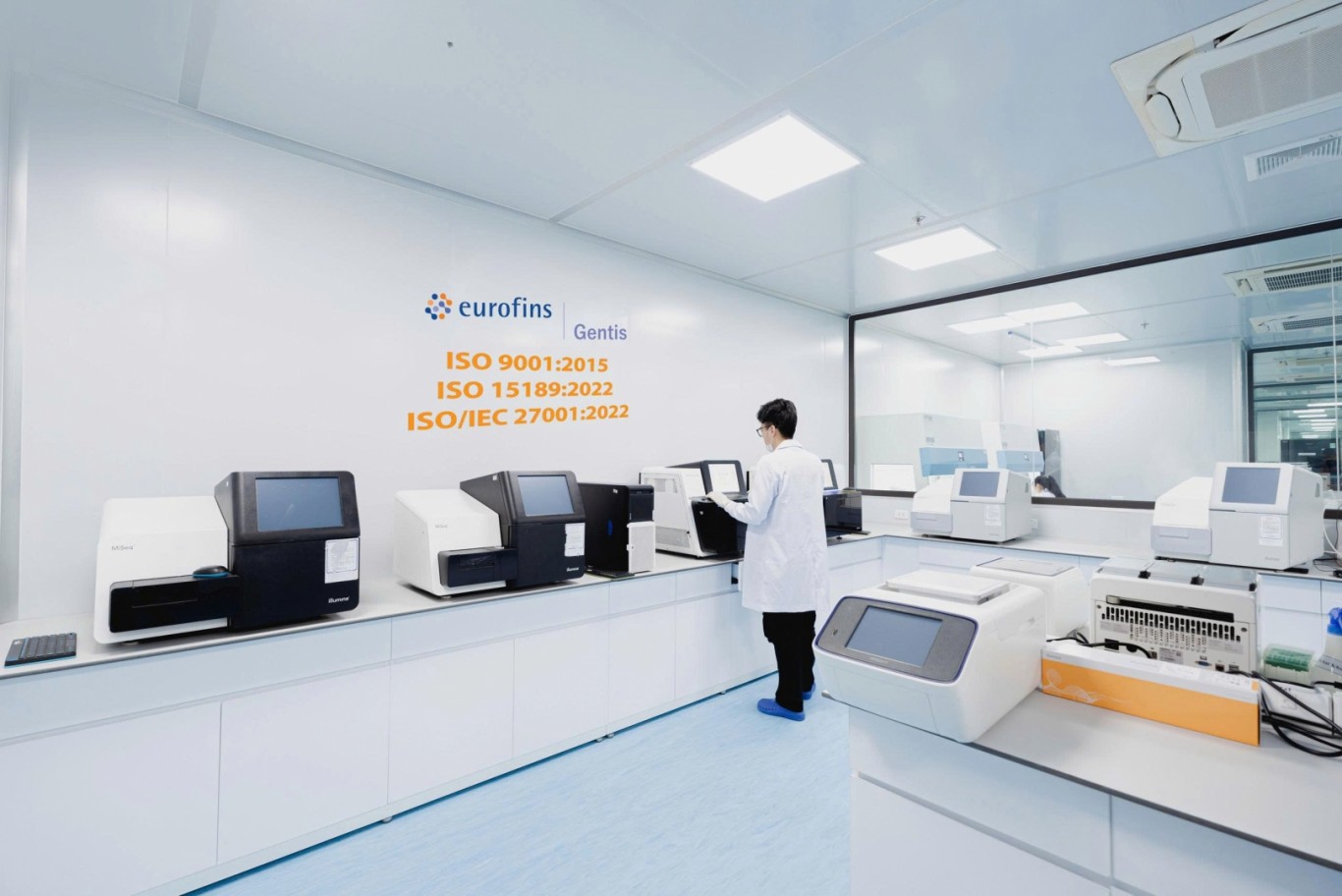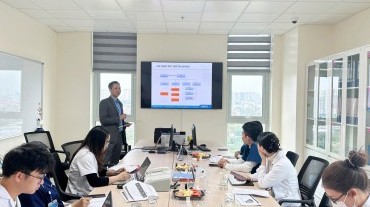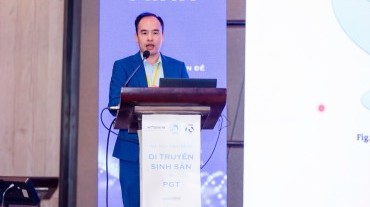To further clarify this concept, we had a discussion with Dr. Nguyễn Quang Vinh, Director of GENTIS Testing Center, an expert with over 15 years of pioneering experience in building, operating, and optimizing laboratory systems in Vietnam.
- Dr. Vinh, could you share your perspective on the concept of Total Quality Management in laboratories?
Dr. Nguyen Quang Vinh: Total Quality Management (TQM) in laboratories is not simply about controlling the quality of test results. It is a holistic management system that encompasses people, processes, technologies, equipment, and especially aspects related to safety, data security, and continuous improvement.
This system is not solely technical but is built on a customer-centric philosophy, with the ultimate goal of ensuring test results that are accurate, timely, and reliable, effectively serving both patients and treating physicians.
 Dr. Nguyen Quang Vinh (Director of GENTIS Testing Center)
Dr. Nguyen Quang Vinh (Director of GENTIS Testing Center)
The entire system involves participation from all staff—technicians, doctors, administrative personnel, and the management team. Every individual plays a role in maintaining quality and improving performance.
Such a system requires the integration of multiple international quality management standards—not just a single tool or framework. This creates a complex but necessary network to ensure accuracy, biosafety, reliability, and transparent traceability in every operation.
- In your opinion, what standards are essential for building a comprehensive quality management system in laboratories?
Dr. Nguyen Quang Vinh: Comprehensive quality management in laboratories is complex. It requires modern management tools and the integration of multiple standards to create a strong and sustainable system.
First is ISO 9001:2015, a general quality management framework that helps organize operations, control processes, and support continuous improvement.
For labs with advanced equipment, ISO 13485:2016 (for medical device quality management) is essential. It ensures that equipment is not only modern but also safe and effective in operation.
Next is ISO 15189:2022, an international standard that has been recommended and widely adopted by Vietnam’s Ministry of Health. It focuses on technical competence and quality in medical laboratories.
Equally important is ISO 27001:2022, which governs information security and data management—especially relevant as AI and digital technologies become deeply embedded in lab operations.
And finally, we must mention CAP (College of American Pathologists), a highly respected standard from the U.S. for laboratories worldwide. CAP has stringent requirements for performance, quality assurance, internal and external audits.
In my view, these standards must be skillfully, flexibly, and coherently integrated. Meeting each one in isolation without a unified system cannot be considered “comprehensive.”
- To meet international standards, what should Vietnamese laboratories do, Dr. Vinh?
Dr. Nguyen Quang Vinh: First and foremost, adopt a systematic mindset. Quality management should not be seen as a checklist of tasks, but as a continuous, integrated operational flow.
Next is serious investment in equipment, infrastructure, personnel, technology, and processes. Laboratories must be bold enough to adopt challenging standards such as CAP and ISO 15189:2022, which will elevate their capabilities.
And most importantly, it takes patience and long-term commitment. It took GENTIS many years to build our current system, which integrates CAP, ISO 15189:2022, ISO 27001:2022, ISO 13485:2016, and ISO 9001:2015. But in return, we’ve earned trust—from experts, partners both domestic and international, and most importantly, from our patients.
- What are the biggest challenges in building a total quality management system in Vietnam?
Dr. Nguyen Quang Vinh: The biggest challenge is the long-term investment mindset. Quality management is not a cost—it is a value. However, many organizations hesitate because they see adopting multiple standards as expensive or only suitable for large laboratories. Some build a system but fail to maintain it.
Another challenge is the availability of specialized human resources. Implementing international standards requires well-trained personnel with the capacity to operate and continuously improve the system—not just “meet the minimum” and stop there.
Lastly, technology and data. As medical information becomes increasingly digital, managing data, synchronizing processes, ensuring information security, and integrating systems is mandatory, not optional.
- With 15 years of experience in the field, what advice would you give to organizations aiming to upgrade their lab quality management systems?
Dr. Nguyen Quang Vinh: My advice is to build a multi-tiered quality management system, where international standards are not treated as final goals, but as tools to be flexibly integrated into practical operations. This not only enhances credibility but also lays a solid foundation for sustainable international integration.
To achieve this, I believe in focusing on several core principles:
- Strong leadership commitment – This is the most critical foundation for achieving consensus and maintaining motivation across the entire system.
- Synchronized integration of international standards, including CAP (stringent U.S. standards for laboratories), ISO 15189 (medical lab competency), ISO 13485 (medical device management), ISO 27001 (information security), and ISO 9001 (quality improvement and customer satisfaction).
- Continuous staff training – Not just for technical updates, but to develop a mindset of improvement and a deep awareness of quality in every role.
- Standardized operational processes – Processes must be clear, executable, auditable, and capable of flexible improvement.
- Regular internal assessments – An effective tool to detect errors early, make timely corrections, and sustain system efficiency.
- A culture of quality – Most importantly, making “quality” a habit and a core value across all activities, from technicians and doctors to administrative and support teams.
An effective quality management system cannot be built overnight. But with the right direction and long-term commitment, it can not only enhance operational efficiency, but also help build trust among customers and professional partners at home and abroad.
- Thank you, Dr. Nguyen Quang Vinh, for your practical and insightful sharing!











